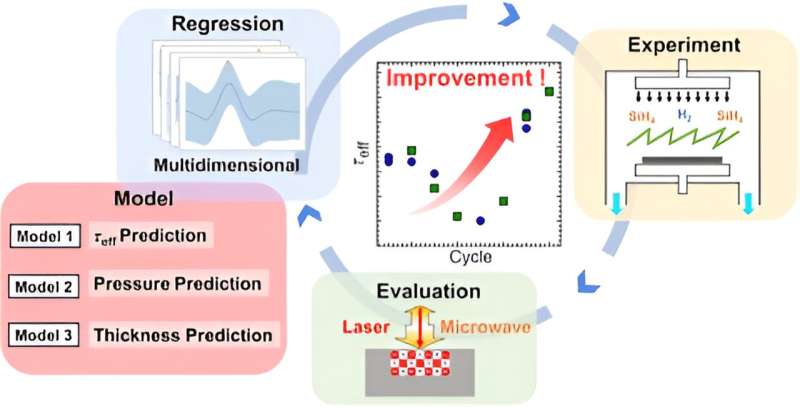This article has been reviewed according to Science X's editorial process and policies. Editors have highlighted the following attributes while ensuring the content's credibility:
fact-checked
trusted source
proofread
Smart optimization paves the way for improved silicon solar cell performance

In the face of the ever-growing threat of climate change, the past few decades have witnessed great progress in solar energy technology. In particular, silicon heterojunction (SHJ) solar cells have become a hot topic in this field since they can reach very high energy conversion efficiencies.
The performance of SHJ solar cells depends, in great part, on the quality of their passivation layer. This thin film made of intrinsic hydrogenated amorphous silicon (i-a-Si:H) helps prevent light-excited charge carriers (like electrons) from being lost through the process of recombination.
Recently, researchers from the Japan Advanced Institute of Science and Technology (JAIST) have been focusing on using a method known as catalytic chemical vapor deposition (Cat-CVD) to form thin passivation films on SHJ solar cells.
Overall, Cat-CVD is an attractive and highly efficient technique that can deposit films without causing damage to the substrate, unlike plasma-based deposition methods. However, determining the optimal deposition conditions to obtain high-quality i-a-Si:H films has proved difficult. This is because Cat-CVD has several adjustable parameters, including substrate temperature, gas flow rates, and deposition time. Thus, determining the best combination through trial and error is extremely time consuming.
Now, in a recent study published in ACS Applied Materials and Interfaces, a research team led by Professor Keisuke Ohdaira from JAIST has developed an innovative and efficient strategy to obtain the optimal deposition conditions for Cat-CVD.
The study was co-authored by Ryota Ohashi, a Master's student, Research Assistant Professor Huynh Thi Cam Tu and Senior Technical Specialist Koichi Higashimine from JAIST along with Dr. Kentaro Kutsukake, a researcher at RIKEN.
The proposed strategy is based on a practical implementation of an optimization technique known as "Bayesian optimization" (BO). This popular methodology, which relies on machine learning, can be used to determine the maxima of a function of an unknown shape.
In the context of Cat-CVD, BO involves a sequential process in which a set of known deposition conditions and their corresponding output are fed to the algorithm, which then predicts the output for deposition conditions not yet evaluated. By repeatedly testing out predicted deposition conditions and feeding the results back to the algorithm, it eventually settles on the optimum values.
However, applying BO to the Cat-CVD problem is not straightforward. "In simple Bayesian optimization, aimed solely at maximizing carrier lifetime, there are no functions to regulate the thickness of the film suggested for the next experimental conditions, leading to thick films that may cause operational problems," explains Prof. Ohdaira.
"Additionally, the experimental conditions suggested may result in combinations that are not feasible, such as mismatches between gas flow rate and the exhaust capacity of the film deposition equipment."
To tackle these limitations, the researchers implemented a practical optimization scheme known as "constrained BO." In this, they combined three different prediction models. The first predicted the deposited film's performance in terms of the charge carrier lifetime.
The second model estimated the deposition pressure based on the input gas flow rates, which helped exclude impossible or unrealistic deposition conditions. Finally, the third model helped constrain the proposed film's thickness while considering deposition time, an important parameter in Cat-CVD.
After feeding their combined model with 14 initial samples (in terms of deposition conditions and experimentally measured film performances), the researchers only had to run eight cycles of optimization to achieve high carrier lifetimes, reaching complete optimization after twenty cycles.
Interestingly, the model's suggestions helped the research team identify previously unknown parameter combinations leading to high carrier lifetimes.
"By varying multiple film deposition parameters according to the suggestions of constrained Bayesian optimization, we found that the combination of substrate temperature during film deposition and the flow rate of the precursor gas SiH4 is crucial for achieving strong ability to suppress carrier recombination," says Prof. Ohdaira. "Constrained Bayesian optimization, thus, provides not only optimal deposition conditions but also scientific knowledge."
Together, the findings of this study showcase the potential of constrained BO for developing not just high-performance solar cells but all sorts of devices. Prof. Ohdaira concludes, "The proposed approach should be applicable across a wide range of fields for the practical optimization of complicated material processes, including film deposition, which is fundamental in the manufacture of most electronic devices."
More information: Ryota Ohashi et al, High Passivation Performance of Cat-CVD i-a-Si:H Derived from Bayesian Optimization with Practical Constraints, ACS Applied Materials & Interfaces (2024). DOI: 10.1021/acsami.3c16202
















